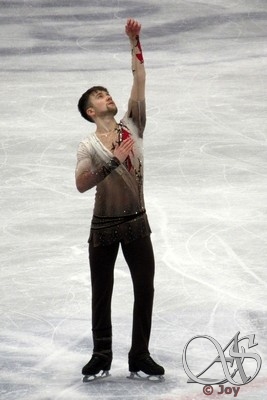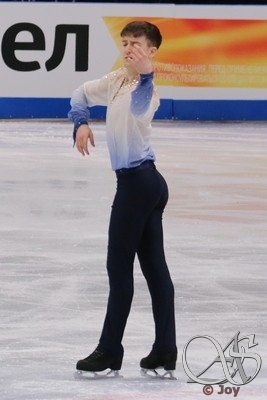Misha Ge: "It was from the heart and people can feel it"
May 8, 2018
By Titanilla Bőd (Új Szó)
Photos © Joy, Mireille Geurts, Reut Golinsky, Ludwig Welnicki
Figure skating at its finest, elements of highest quality combined with true art – that is Misha Ge. Even though he never stepped into the crazy quad race, his programs left a significant mark.  Fans love him, fellow skaters love him, and even though his transition from competitor to a choreographer seems now inevitable, we can still look forward to his performances in shows. I had a chat with Misha at Worlds in Milano after the gala practice.
Fans love him, fellow skaters love him, and even though his transition from competitor to a choreographer seems now inevitable, we can still look forward to his performances in shows. I had a chat with Misha at Worlds in Milano after the gala practice.
Last year after the Worlds in Helsinki you said you were not sure if you would continue or not. What made you to stay in the end?
There were a few things and we spent a few months in consideration. We had to know if my country wanted me to continue, because everything had been on my and our parents' shoulders for years, so it was important in an Olympic year to know what the federation wanted. The second thing was that I had to check my joints, if they were capable to go on for one more season. We spent a few months recovering and seeing if my joints could manage one more year. It's tough, I don't do that many crazy difficulties, but it's such a big pressure on my joints. So we spent time and then created this plan, how I could go to these five competitions, with my body staying in one piece. Then we decided we would give it a shot.
 Did you have to adjust your practice?
Did you have to adjust your practice?
We adjusted a lot. It was a complete re-adjustment. We got to a point that we had to count how many jumps I could do in a practice, because I should not overdo things in a day. Even if I needed it, I had to stop, because my body immediately reacted. And even with this plan I had problems and pains throughout the season.
So how many jumps were you allowed to do per practice session?
It depended also on the time of the season, how much time there was to the next competition. My coach, my dad had such a detailed plan for every day. Each day was different, based on my condition and health.
What were your expectations in this season? Did you have any particular goals or did you just want to enjoy this one last year to the fullest?
Just to improve the things I'm capable of. I just tried to maintain my body so that it could go through one more season. But I also wanted to improve in all those little details I can improve. Not chasing the impossible, things that would kill my body. Even though it still causes a lot of harm, but at least I'm still alive.
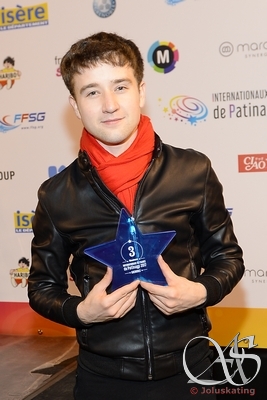 You've always been the skater who puts emphasis on the art and the emotions, and you many times said it is not the medals that motivate you. But in your last season you won a Grand Prix medal, so probably you were very happy about that. Was it kind of a satisfaction for you?
You've always been the skater who puts emphasis on the art and the emotions, and you many times said it is not the medals that motivate you. But in your last season you won a Grand Prix medal, so probably you were very happy about that. Was it kind of a satisfaction for you?
It was an achievement. Everybody has different goals and for us a Grand Prix medal means a lot. There were a few times when I was very close, I had great performances, and I was fourth. It was a little disappointment. But the Grand Prix medal in France maybe meant even more for fans. I was shocked how happy they were. They were screaming! I was happy, too, but they were much happier, they waited for it for a long time. Two or three times I performed clean programs and I was still fourth, so they finally could celebrate.
But many of them were upset that when you finally got to the podium, there was not a medal, but a plastic star awarded to the top three competitors…
When I met the Russian fans, they gave me a proper handmade medal. I really appreciate that.
Before this Grand Prix you also had some visa issues, which you were struggling with throughout your entire career.
I try to take it as it is. I can't control it. It's not that we hand in something late or some paper from us is missing. Many times the invitation sent to us is late. Sometimes we have back to back competitions and we have just a week or ten days for all the paperwork. Normally for consulates and embassies it's not enough time. Not every embassy has the same rules and sometimes they just don't want to do it for you. They don't care if you are competing or not. So, it's a lot of struggle. And me and my coach are on different passports, that can cause additional problems. Even this time, we were back from Pyeongchang, I started to apply for documents for Italy and the Italian consulate gave us an appointment for April 9. Then there were nerves for a week, to get in touch with the Italian organizers of the Worlds, they got back to the embassy, the embassy got back to them, they got back to federation, the federation got back to me to figure out and change the day! So in the end five days before we were leaving, they gave us an appointment, and a few days before the flight I got the documents.
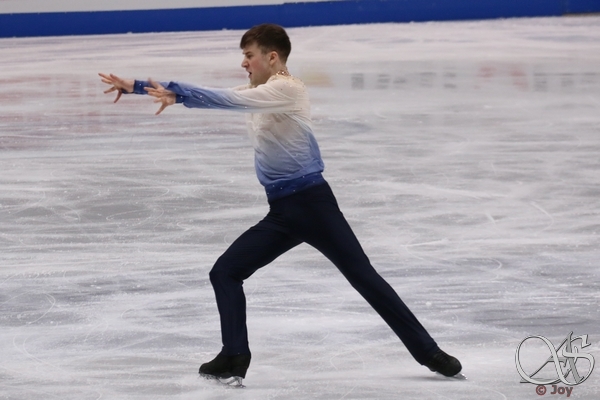
This must be a huge stress for an athlete…
But I can't control it. I just have to deal with it. My federation can do anything, but they are in Uzbekistan, and I have to do everything on my own. People sometimes say, hey, you have more opportunities than big countries, but they don't see our difficulties. There are a lot of things that are much more difficult for us, than for them. Both of my parents have to work twice as much in their jobs and on my training, and of course I also have to work in between so that we can maintain that. Then there are a lot of visas, documents… There is so much of it. I could keep going on and people don't see it. They say: "Oh, Misha, stay one more year", but they only see from their perspective, they see five minutes of shine. They don't see the years of difficulties, the weight on the shoulder on the whole family.
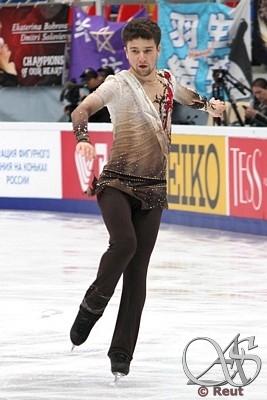 So now you have definitely decided to stop?
So now you have definitely decided to stop?
Let's say, pretty much.
Is there any slight chance that we will see you competing in the future?
Pretty much that's the end.
In Pyeongchang you said that probably you will be in Beijing as well, maybe as a coach, or a choreographer, or part of the organizing committee…
Yes, it might be. There is still four more years to go and there are a lot of fields that I can work in. Slowly we'll see and we will work on that. I would be happy to be part of the Olympics again, just from a different perspective.
How different was Pyeongchang from your Sochi experience?
The funny thing is that both of them were particularly my home. I'm partly Russian, partly Korean… Of course Europe and Asia are different, but they both have their own uniqueness. As for my performances… In four years you become older. But it has pros and cons. You have more knowledge, but on the other hand everything is harder on your body. So you have to be very smart to manage all the things. But Olympics are always unique.
You said it's pretty likely that these Worlds were your last competition. What did it feel when you took the ice?
It's emotional. But there is so much emotion that it's hard to describe them in a couple of words. You are happy, but also at the same time it's like a pulse in your head… And then all those years of your career just in a blink… It's emotional. But I'm really glad to have a competition like this and to have such kind of a bow.
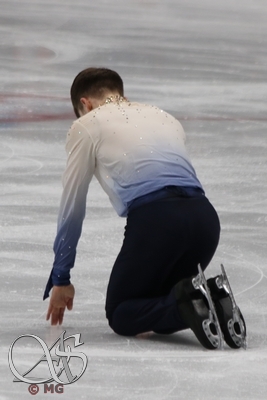 When you finished your free program, many people were crying.
When you finished your free program, many people were crying.
It was from the heart and people can feel it. That's one of the things why I'm doing it – to bring emotions to people. Real emotions. And I'm glad people feel this way.
Did you have any particular message in your mind when you choreographed the programs for this season?
They have two stories. It's the story of the music at first, but the second story is an 'own story'. Both programs are created on my own true story, but the choreography is done in a way that it's everybody's story. The short program is called Pain of the Heart. In our lives we have moments of pain and struggles. Even as years pass by, we look back and those pains still might be bleeding. But at the same time we realize that just because of those pains we've become stronger, we've become the person we are today. It's my own story, but it's the story of everyone. That's the same with the free program. It is called The Memories of Youth. Even though I'm in my twenties, I've been living around the world and I've seen some stuff. Of course not as much as my parents and older people, but still. This is a message about the memories of someone's childhood, junior times, university times. First crush, first walk by the river, first touch of the hand, first kiss, first stargazing together… We all have that, in different ways. We keep the beauty of these memories in our hearts through the years.
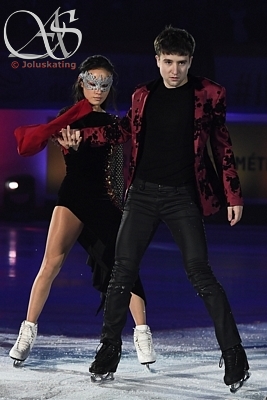 In your show programs you usually show another side of your personality, the funny and crazy guy.
In your show programs you usually show another side of your personality, the funny and crazy guy.
I'm everything! I don't want to sound over-confident, I'm just saying I'm multi. I love drama, I love comedy. I love the things that make you cry, I love the things that make you laugh.
So you probably follow lot of different arts…
Yes. It can be an art gallery, opera, an electronic music DJ concert… You have to study a variety of things.
And when you are choreographing a program for someone else, how do the rules and the rule changes affect you?
We have to wait for the congress, but there is a lot of talk about the changes. How much things can really be changed, nobody knows. I think we have to wait when the congress sets out everything.
There were also rumours that there should be a technical program and a creative program. What do you think about this?
These things have to be decided by tens, hundreds of people together, to see how we can move forward. But for me, the most important thing is to make skating more popular. There is no particular way we have to do to make it happen, but through all people's suggestions, votes, thinking, bringing ideas on the table, discussions, the main goal is making skating more popular, so we can have new generations evolve into it, new people, new sponsors, new TV companies broadcasting… It's a chain reaction. If we make it popular, there will be much more opportunity for the entire skating world in the future.
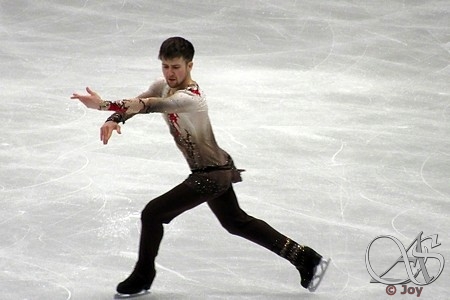 Do you also see yourself in this process?
Do you also see yourself in this process?
Yes. But as I said, I might have some ideas, but it shouldn't be one person's ideas, it should be a discussion.
What shall we expect from you next season? Will you travel to competitions with your students, sitting in the Kiss and Cry, dancing by the boards during their programs?
I will try to balance it, not overdancing! You can check that at Skate America I wasn't dancing when Sergei Voronov was skating. I was controlling myself. Of course it's not easy to watch your choreography on ice, because you know the entire sequence, movements, transitions… So you are really skating with your skater. But the performance is not controlled by you. One of my mentors, Mr. Frank Carroll told me once: "Sometimes we as coaches are watching you guys, we are more nervous than you, because we can't control anything! We would love to take our boots and go on the ice, but we are just watching from behind the boards."
Do you think it helps that you are the similar age as the skaters you are making choreographies for?
I try to combine past and present. The school of our mentors, a few generations older than me, I try to learn the basics, and combine it with the modern times, the needs of skaters and the teams. It is not easy. I try to feel the vibes of the skaters, to let them feel comfortable, but at the same time do the work that the whole team needs.
What is your wish for the future?
Keep improving. No matter what you do, keep improving.
